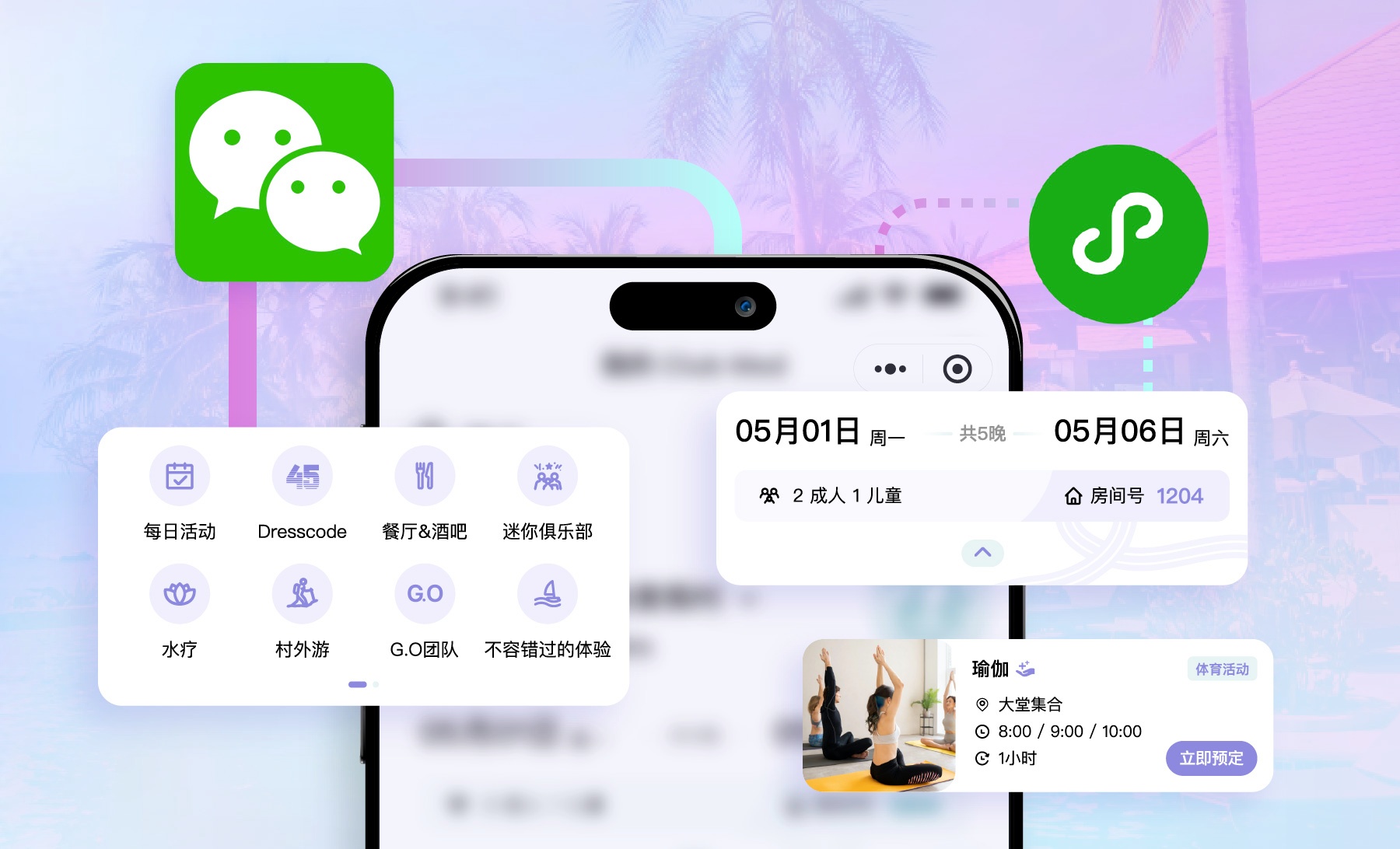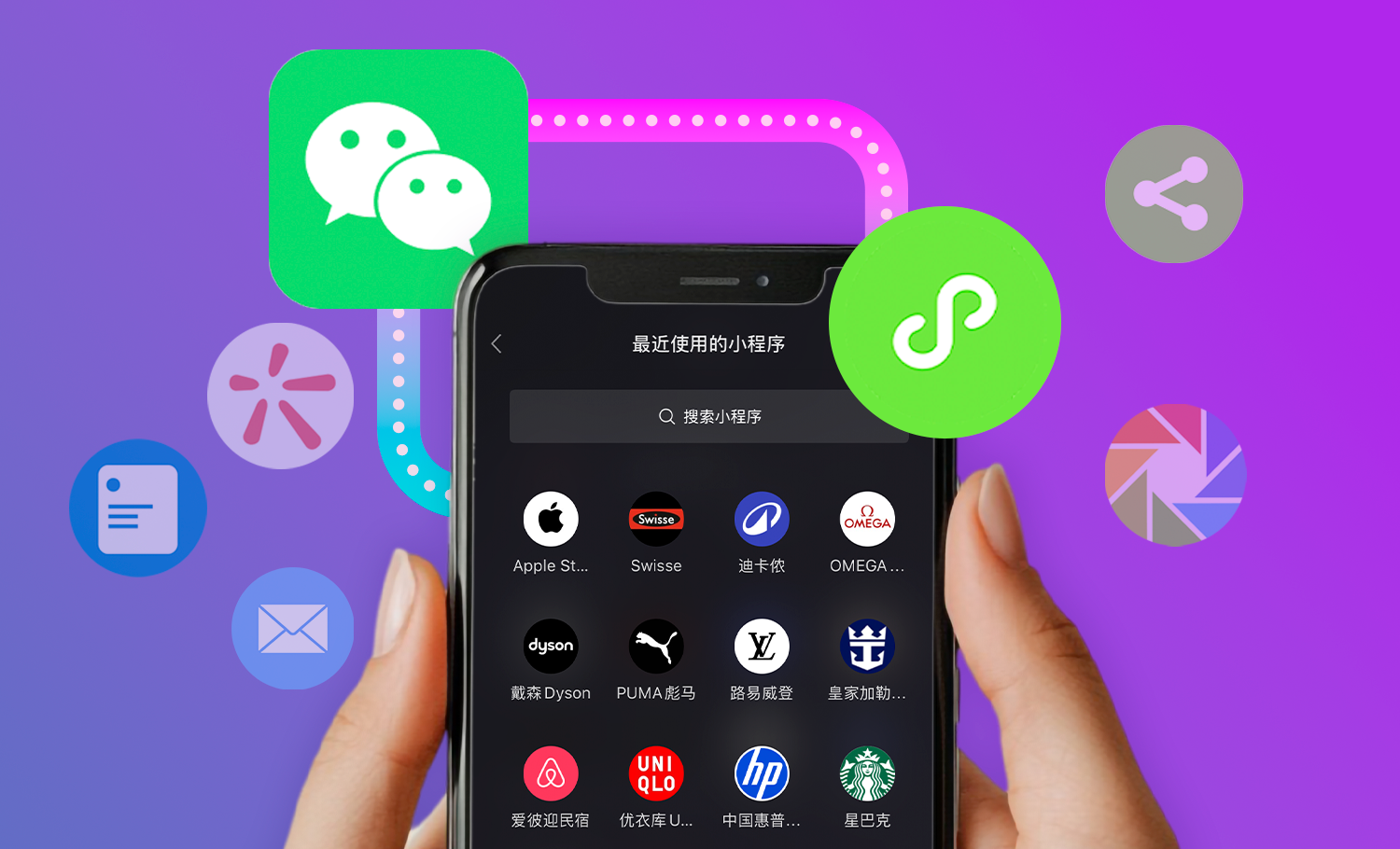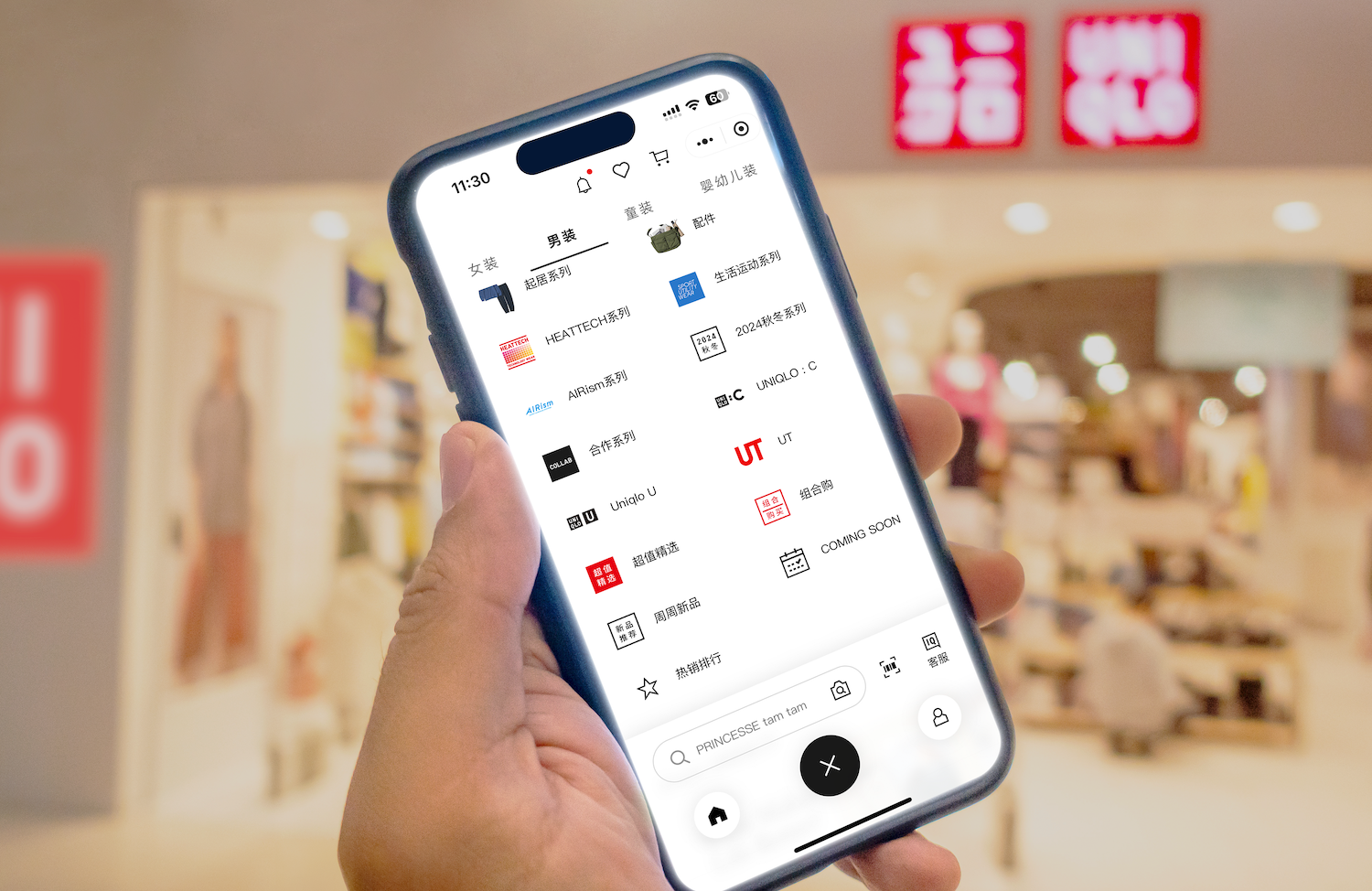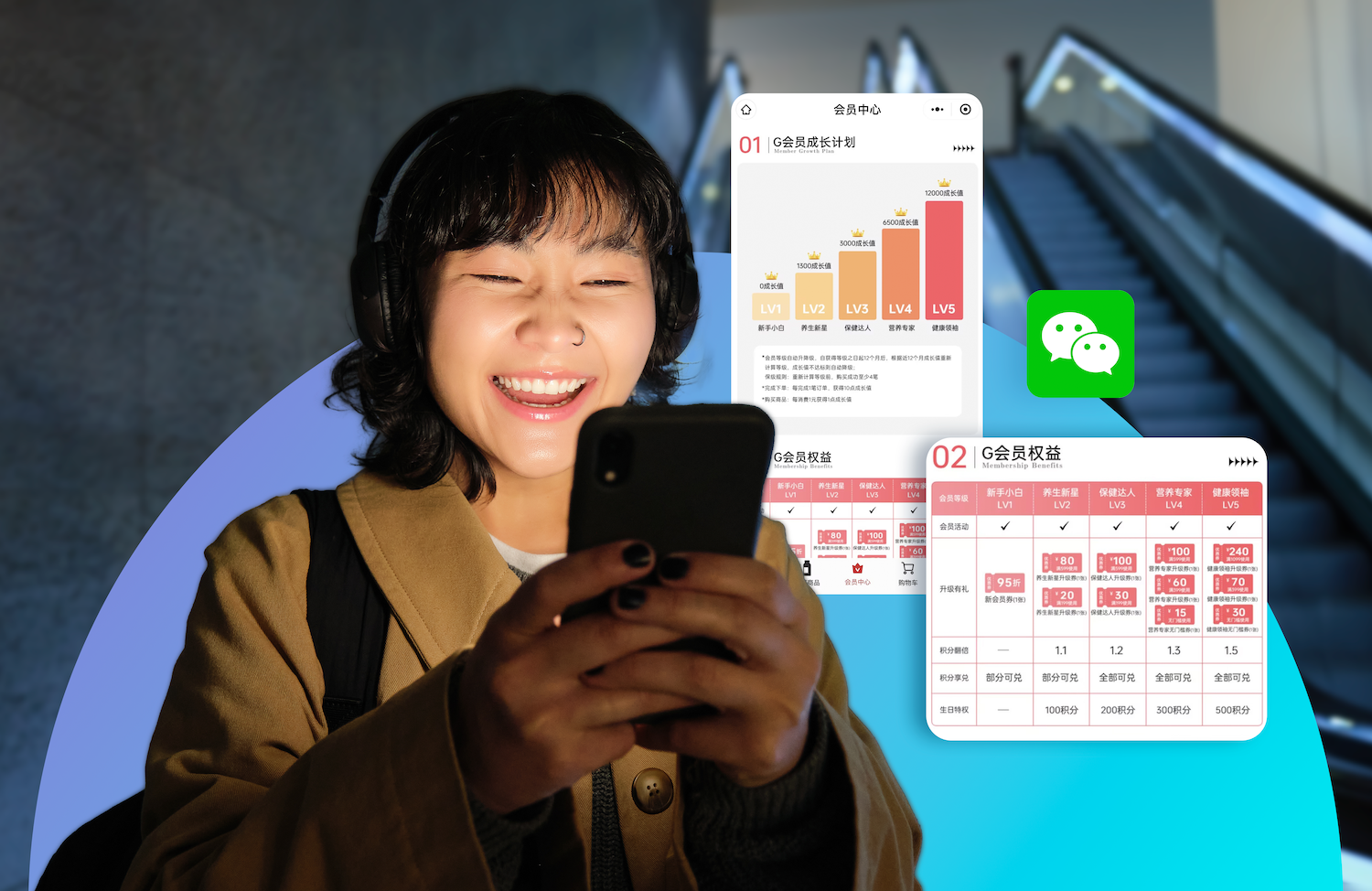With the intensification of competition in China's eCommerce market and the emergence of social commerce platforms such as Weidian, Douyin (TikTok Shop), and Xiaohongshu, traffic sources have become more diversified, and customer acquisition costs have risen rapidly.
Within this context, cultivating brand loyalty through China's so-called "private traffic*" is a cost-effective method chosen by many well-known overseas brands.
Establish a strong online presence and boost your store's sales with our China eCommerce solutions.
WeChat is undoubtedly the most popular social platform in China, with more than 1.4 billion users. Since mini-programs can be used immediately without the need to be downloaded, they have become an important tool for brands to manage private domain traffic and leverage it to increase their business. According to data from Tencent, the number of WeChat Mini Program users in 2025 exceeded 1.1 billion MAU. Some benefits for brands using mini-programs include:
- Directly interact with users without leading them away from their go-to platforms.
- Reaching users directly without paying, thus reducing customer acquisition costs.
- Data can be used within WeChat's ecosystem for more marketing activities.
This article will explore successful mini-program implementations from top foreign brands that utilize the WeChat eCommerce ecosystem chain, including official accounts and WeChat for Business, to provide inspiration and reference for overseas brands seeking to explore the Chinese market.
*Private domain traffic in eCommerce refers to that which is fully controlled by the brand, like its official website, mini-programs or apps, and WeChat accounts, as opposed to public traffic from third-party platforms and marketplaces.
1. Swisse
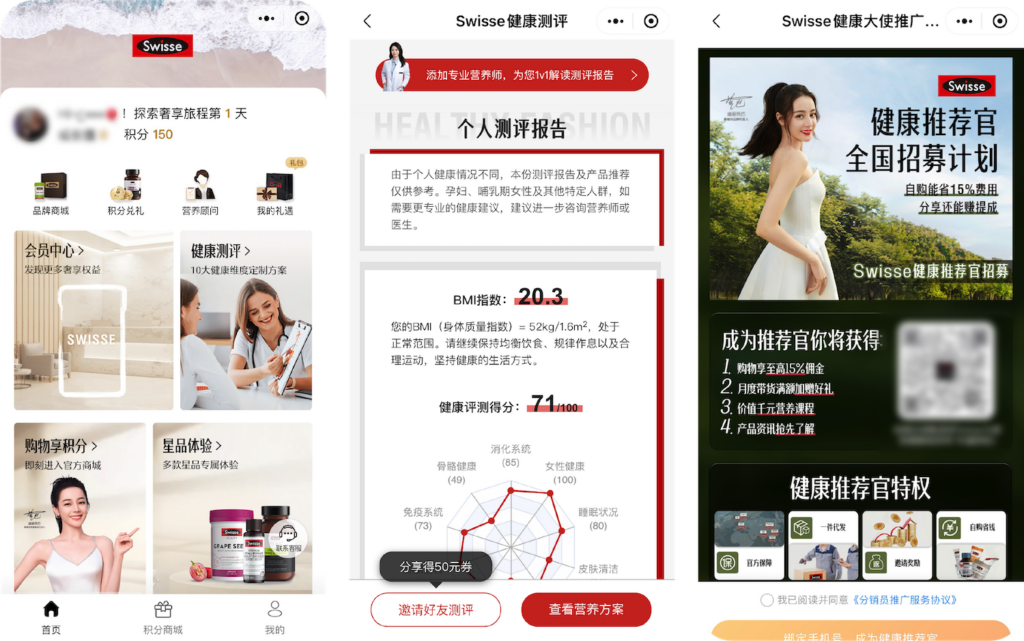
Swisse is a well-known Australian health supplements brand that has successfully GROWN its own private domain traffic pool in the Chinese market through WeChat mini-programs with remarkable marketing results with a highly-unified "Official account + Mini-program + WeChat Business + Community" matrix as the core of its China business, and supported by public domain traffic with channels such as Douyin, Xiaohongshu, and Weibo.
In terms of private domain operations, Swisse kickstarts its marketing efforts with an automated welcome message on its official account that guides users to become members and interact with a series of functions, like joining the "SI Family" community, connecting with a nutrition consultant, and scan a QR code to reach a company representative.
Furthermore, the WeChat official account pushes its mini-program "Swisse Luxury Enjoyment" which has rich interactive sections:
- Personal Health Assessment: Users can answer questions to obtain personal assessment reports, which encourage them to review nutrition plans and get personalized Swisse product recommendations. At the same time, users can add corporate WeChat accounts and connect with a registered nutritionist to get a 1:1 interpretation of the report.
- Members Center: Displays the user's current level, with each membership tier having different benefits and a points redemption system to encourage loyalty.
- Reminders to Eat: Allow users to set reminders based on the products they consume, increasing interaction between brand and user.
- Health Recommender Program: This advocacy module encourages users to share product information in their social circles by inviting friends to get coupons and join the community. Users can get high-value returns such as commissions, gifts for bringing in goods, and advanced nutrition courses, effectively making users' social networks a channel for promoting products and obtaining social traffic and customers at a lower cost.
Build a more unified user experience and leverage the latest shopping innovations to monetize your WeChat Store with TMO's WeChat Development Services and other Social Commerce solutions.
2. MISTINE
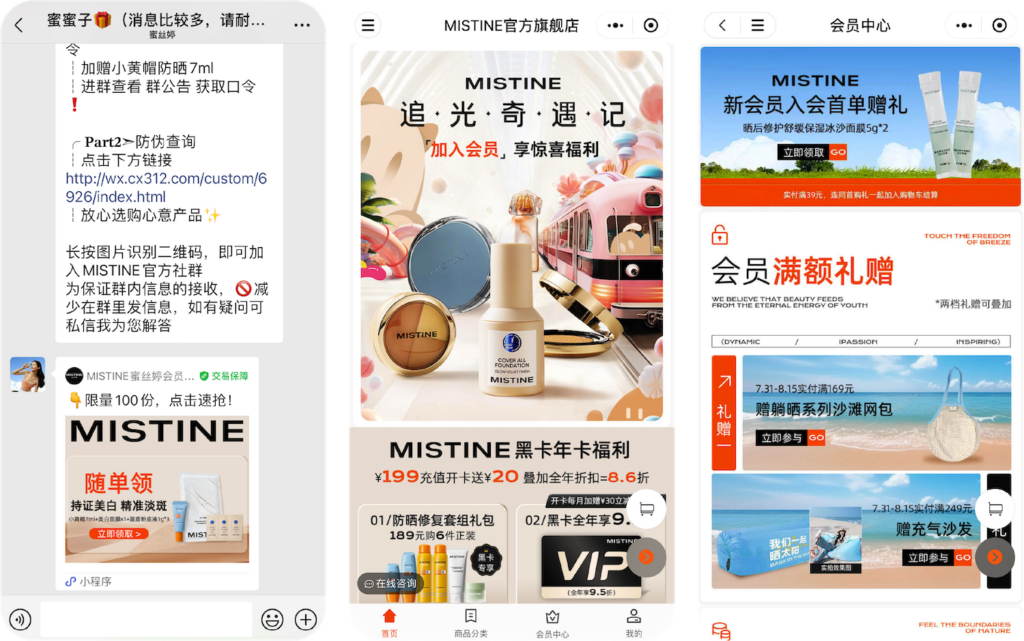
MISTINE is a well-known beauty brand from Thailand that has performed well in the Chinese market in recent years, particularly among Gen Z shoppers.
In the first half of 2024, it lead the sunscreen category last year a spot that had long been occupied by the Japanese brand ANESSA. In addition to using spokespersons and multiple video channels to promote sales, MISTINE has also successfully leveraged private traffic to promote sales.
The company uses its WeChat Official account, groups, a brand assistant personal account, and mall mini-program as platforms for generating private traffic, establishing channels for effective communication with fan groups, and promoting user conversion of different products.
See how MannatechMannatech's legally-compliant China bonded cross-border model provides an optimized eCommerce experience on WeChat and across desktop, mobile, and tablet.TMO helped Mannatech offer an optimized eCommerce experience on WeChat and across desktop, mobile, and tablet, as well as integrated cross-border features.
Similar to Swisse, MISTINE uses a welcome message on its official account that guides users through different actions such as adding a brand assistant, joining the community, or entering the brand's official channels.
Once registered, users can unlock privileges such as community-exclusive activations and 1:1 exclusive services. Users scan the QR code to add the brand assistant's corporate WeChat account, establishing a humanized link with the brand at the initial stages of interaction.
The brand assistant's personal WeChat account funnels users to the "MISTINE Member Mall" mini-program through limited gift events. The mini-program is not only a channel for selling products, but also an important tool for the brand to interact with its consumers. Some of its features include:
- A homepage inviting visitors to become members and serves personalized content to its users.
- The mini-program also leverages upselling features such as gifts that come with certain purchase amounts or welcome benefits to new members on their first order.
- Custom communication allows content and items to be served based on different user segments and demographics, thus increasing member activity, conversion, and lifetime value.
- A points-based reward system that encourages users to interact and repurchase. Users accumulate points in the form of "honey" that accumulates through actions such as adding products to favorites, sign-ins, member day shopping, and other interactive behaviors.
The Maximin Mall mini program is also connected to the video account. Through the floating window feature offered by WeChat, users can enter the video account to watch promotional live broadcasts and promote conversions without leaving the mini-program.
3. Lululemon
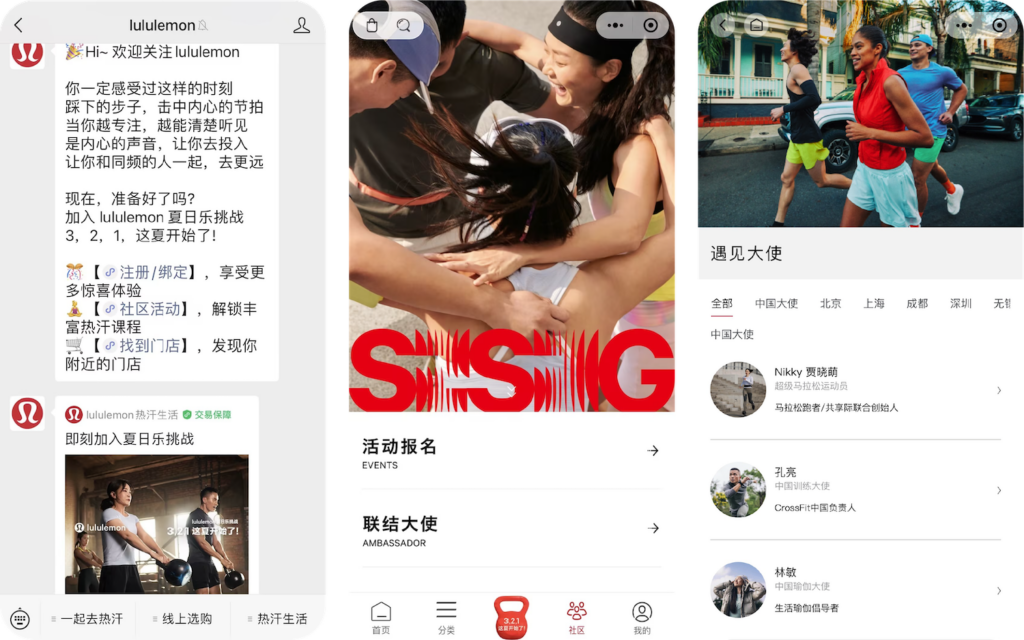
As a Canadian yoga sports brand, Lululemon has built an online community-exclusive mini program "Lululemon Sweatlife". This mini-program is a digital platform launched by the brand to enhance community connections and improve user experience. It integrates community activities, content sharing and mall functions to provide consumers with convenient services as well as a rich sports life experience.
- Participation in community activities: Through the mini-program, users can sign up for various community activities organized by Lululemon, such as the "Summer Fun Challenge". These activities often cover multiple levels, including store, city, regional, and national competitions that users can register for.
- Content sharing: Sports and healthy living content is shared by brand ambassadors and community members. Individual users or KOLs recommend products to people in their social circles and use their influence in social networks to drive sales through natural sharing user experience.
- Mall function: A built-in mall where users can directly purchase all kinds of sports equipment and enjoy the convenience of online shopping.
- Find a store: Find nearby stores to promote online-to-offline traffic.
- Community marketing: Lululemon focuses on product promotion and guiding user consumption by establishing communities, publishing product promotion content, product updates, KOC outfit sharing, etc. Community operations are usually managed by store employees, who guide users to join through corporate WeChat, provide community-exclusive benefits, and introduce store locations and other information.

See Feidekai (Fitline)Feidekai's B2B2C “New Retail” eCommerce platform offers Store Management & Procurement for its dealers, and a Marketplace for end users in the Chinese market.how Feidekai built a custom WeChat Mini-Program Store with management and procurement solution for its dealer network, as well as a marketplace for end users, all while bridging online and offline retail operations.
4. Starbucks
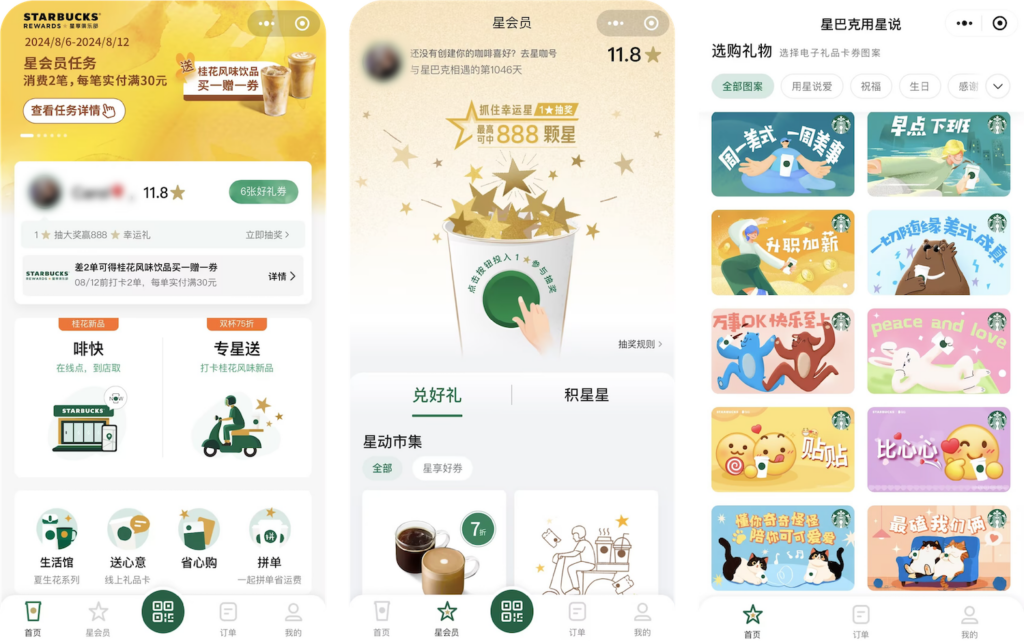
Starbucks has launched a series of digital marketing strategies and membership programs through WeChat Mini Programs that strengthen its connection to Chinese consumers. In 2022, Starbucks launched the "Star Rewards Club" WeChat Mini-program, where users can earn membership points and redeem coupons. In the past two years, Starbucks has also continued to innovate and optimize its private eCommerce operations.
Through the mini-program, users can easily register and become members of the Rewards Club and enjoy the points benefits that has a detailed level system including Silver Star, Jade Star, Gold Star and Diamond Star membership tiers, providing corresponding benefits and rights for users.
Through the "Yongxingshuo" function of the subsidiary mini-program, animated characters are used to encourage friends to give coffee/card coupons, activating the user's social circle traffic Users can customize the "blessings" when sending gifts to stimulate purchasing especially during holidays, special anniversaries, and other consumption peaks. By growing its private domain traffic pool, Starbucks can carry out subsequent marketing activities and activate the potential of social commerce.
Based on the user's consumption behavior, Starbucks analyzes the user's historical purchase SKU data to infer taste preferences and push personalized discount information and event notifications, increasing user stickiness. In 2024, Starbucks launched the "Star Classmate Card" to provide exclusive discounts for students.
In addition, Starbucks has also created a "third space" community operation where baristas can invite users to participate in offline coffee tasting sessions in the corporate WeChat group, enhancing the connection among users and with baristas. The "Bear Store Manager" interacts with users in the community, and distributes fan benefits during peak coffee consumption periods every day to promote consumption.

Strategies for leveraging private traffic through mini-programs
In the current digital marketing environment in China, mini-programs are an important tool for brands to leverage traffic and strengthen user connections. Here are some key strategies:
| Strategy | Action |
| Membership system and points rewards | Provide members with points rewards and a rating system that encourages continued participation and consumption. Members of different levels can enjoy different benefits, increasing user loyalty. |
| Personalized Marketing | Activate user social circle traffic through mini-program functions, such as sending gifts and inviting friends. Use social networks for fission marketing, encourage users to share and recommend, and acquire new users at a low cost. |
| Social Interaction | Use mini-programs to attract target users to join brand communities and conduct user interactions and marketing activities. Use brand IP or community leaders to interact with users, enhance user identification with the brand, and improve user stickiness and conversion. |
| Private Community Operation | Through mini-programs, users can be guided to participate in offline activities, such as tasting sessions and challenge activities, to enhance user experience. The store search function of mini programs can be used to promote mutual online and offline traffic. |
| Leverage KOLs and brand ambassadors | Select KOLs and brand ambassadors who match the brand values, target market and brand image, and encourage them to use their personal charm and expertise to recommend products to users and leverage their social influence to expand the reach of brand information. |
| Online-to-Offline integration | Through mini-programs, users can be guided to participate in offline activities, such as tasting sessions and challenge activities, to enhance user experience. The store search function of mini-programs can be used to promote mutual online and offline traffic. |
Enhance your Multichannel eCommerce Strategy with TMO
In the context of high digital marketing costs and scattered user attention, private domain traffic has become a new hot spot for corporate marketing. In the Chinese market, the combination of private traffic and mini-programs present overseas brands with an efficient and low-cost market development tool. By drawing on the experience and strategies of successful cases, brands can better manage and operate private domain eCommerce, improve user stickiness, and increase sales.
TMO has extensive experience in WeChat eCommerce development. Through private domain mini-programs, WeChat Store and other mechanisms, we are committed to helping brands succeed in the Chinese market. We provide you with solutions suitable for various eCommerce models and integrated multichannel management to ensure that your brand stands out in this highly-competed market.
If you are looking for WeChat Development Services and other Social Commerce solutions, we can help you implement a multichannel eCommerce strategy that allows you to tap into the country's vast online landscape. Contact us to discuss your specific project needs!


